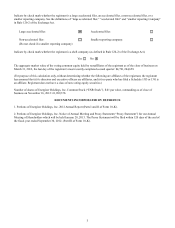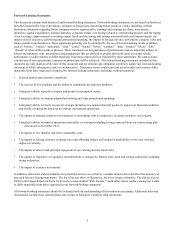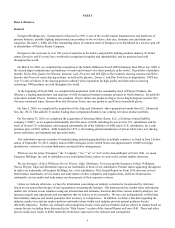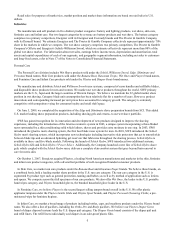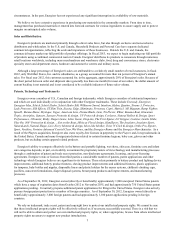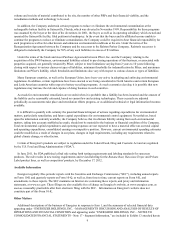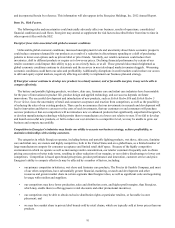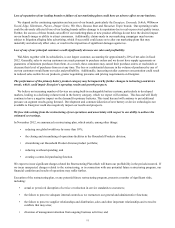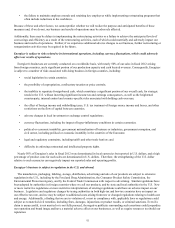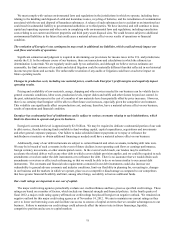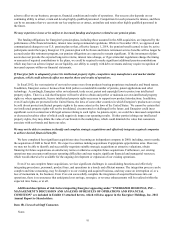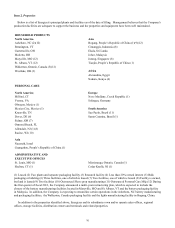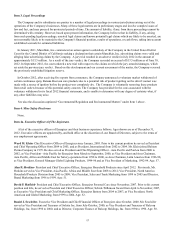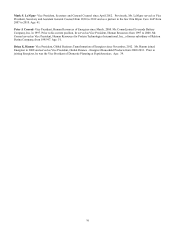Energizer 2012 Annual Report Download - page 22
Download and view the complete annual report
Please find page 22 of the 2012 Energizer annual report below. You can navigate through the pages in the report by either clicking on the pages listed below, or by using the keyword search tool below to find specific information within the annual report.• the failure to maintain employee morale and retaining key employees while implementing restructuring programs that
often include reductions in the workforce.
Because of these and other factors, we cannot predict whether we will realize the purpose and anticipated benefits of these
measures and, if we do not, our business and results of operations may be adversely affected.
Additionally, there may be delays in implementing the restructuring activities or a failure to achieve the anticipated levels of
cost savings and efficiency as a result of the restructuring activities, each of which could materially and adversely impact our
business and results of operations. Further, if we experience additional adverse changes to our business, further restructuring or
reorganization activities may be required in the future.
Energizer is subject to risks related to its international operations, including currency fluctuations, which could adversely
affect our results of operations.
Energizer's businesses are currently conducted on a worldwide basis, with nearly 50% of our sales in fiscal 2012 arising
from foreign countries, and a significant portion of our production capacity and cash located overseas. Consequently, Energizer
is subject to a number of risks associated with doing business in foreign countries, including:
• social legislation in certain countries;
• the possibility of expropriation, confiscatory taxation or price controls;
• the inability to repatriate foreign-based cash, which constitutes a significant portion of our overall cash, for strategic
needs in the U.S. without incurring significant income tax and earnings consequences, as well as the heightened
counter-party, internal control and country-specific risks associated with holding cash overseas;
• the effect of foreign income and withholding taxes, U.S. tax treatment of foreign source income and losses, and other
restrictions on the flow of capital between countries;
• adverse changes in local investment or exchange control regulations;
• currency fluctuations, including the impact of hyper-inflationary conditions in certain economies;
• political or economic instability, government nationalization of business or industries, government corruption, and
civil unrest, including political or economic instability in the countries of the Eurozone;
• legal and regulatory constraints, including tariffs and other trade barriers; and
• difficulty in enforcing contractual and intellectual property rights.
Nearly 50% of Energizer's sales in fiscal 2012 were denominated in local currencies but reported in U.S. dollars, and a high
percentage of product costs for such sales are denominated in U.S. dollars. Therefore, the strengthening of the U.S. dollar
relative to such currencies can negatively impact our reported sales and operating profits.
Energizer's business is subject to regulation in the U.S. and abroad.
The manufacture, packaging, labeling, storage, distribution, advertising and sale of our products are subject to extensive
regulation in the U.S., including by the Food and Drug Administration, the Consumer Product Safety Commission, the
Environmental Protection Agency, and by the Federal Trade Commission with respect to advertising. Similar regulations have
been adopted by authorities in foreign countries where we sell our products, and by state and local authorities in the U.S. New
or more restrictive regulations or more restrictive interpretations of existing regulations could have an adverse impact on our
business. Legislative and regulatory changes by taxing authorities in both high-tax and low-tax countries have an impact on
our effective tax rate, and we may be subject to additional costs arising from new or changed regulations relating to health care
and energy. Additionally, a finding that we are in violation of, or not in compliance with, applicable laws or regulations could
subject us to material civil remedies, including fines, damages, injunctions or product recalls, or criminal sanctions. Even if a
claim is unsuccessful, is not merited or is not fully pursued, the negative publicity surrounding such assertions could jeopardize
our reputation and brand image and have a material adverse effect on our businesses, as well as require resources to rebuild our
reputation.
12


